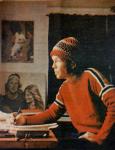 Poet, biographer and Fenwick alumnus Tom Clark ’59 died tragically in mid-August. Mr. Clark, 77, was struck by a motorist while walking in his hometown of Berkeley, CA, on August 17th, the Public Broadcasting Service (PBS) reported. He died of his injuries the next morning.
Poet, biographer and Fenwick alumnus Tom Clark ’59 died tragically in mid-August. Mr. Clark, 77, was struck by a motorist while walking in his hometown of Berkeley, CA, on August 17th, the Public Broadcasting Service (PBS) reported. He died of his injuries the next morning.

Clark was born in Oak Park in 1941. “Many Fenwick men from our class attended Ascension grammar school with Tom. I was among them,” writes Tom Maloney ’59, who resides in Chicago. Mr. Maloney remembers his classmate’s artistic abilities. “No one could draw like Tom Clark,” Maloney recalls. “He was a great artist.”

Writing, however, became Clark’s forte. “He is considered one of America’s finest poets,” Maloney continues. “He was an accomplished and knowledgeable baseball writer. Add to his literary achievements a biography on Jack Kerouac,” the 1950s’ Beat Generation novelist and poet (portrayed at left).
Clark was, indeed, a prolific writer, compiling two dozen collections. He once said that his literary influences came from Ezra Pound and William Carlos Williams, leaders of the rebellious “Imagist” poetry movement in the 20th century.
He graduated from Fenwick and went on to the University of Michigan, where he was a student of former U.S. Poet Laureate (2006-07) Donald Hall, Jr. Last year before his own death, Hall called Clark “the best student I ever had.”

After earning his under-graduate degree in 1963, Clark became poetry editor of the Paris Review. A glowing recommendation from Hall convinced Editor-in-Chief George Plimpton to hire the then 22-year-old. Fifteen years ago Clark told poetry publication Jacket magazine that his “sole stipulated condition [at the time] was that I be allowed to send out rejection notices to all the poets who’d lately had verse accepted by my immediate predecessor, X.J. Kennedy.” Plimpton embraced the rebel in Clark, who would stay on for 10 years and bring to the Paris Review’s pages the work of so-called New York School poets, including Frank O’Hara, Barbara Guest, Amiri Baraka, singer-songwriter Lou Reed and, later, Ron Padgett.
Beatniks in England
While studying for his master’s degree in 1965 at Cambridge University under a Fulbright scholarship, Clark had a chance encounter with Allen Ginsberg. He ran into the Beat poet at a pub in Bristol, and the two men proceeded to hitch-hike to London. He then enrolled at the University of Essex for two years.

In the New York Times, peer poet Padgett has described Clark’s subtle work as “music to the ear” that always left readers feeling “elevated.” Billy Collins, another poet laureate, called Clark “the lyric imp of American poetry” in a Boulder News article. (Clark once resided in Boulder, CO.) In reviewing Clark’s 2006 poetry collection, Light & Shade, Collins wrote: “Tom Clark … has delivered many decades’ worth of goofy, melancholic, cosmic, playful and wiggy poems. I can never get enough of this wise guy leaning on the literary jukebox, this charmer who refuses to part with his lovesick teenage heart.”
From 1987-2008 Clark taught poetics at New College of California in San Francisco. More recently, he wrote regularly on a personal blog, “Beyond the Pale,” even hours up until his death.
“Tom and I were married for 50 years,” writes his widow, Angelica Heinegg. “It’s a time of shock and sorrow for me and my daughter, Juliet. But we are slowly adjusting to the new reality.” They scattered his ashes on September 9th.
Sports scenes

While growing up, Clark worked as an usher at both Wrigley Field and the old Comiskey Park. He saw such luminaries of the sporting world as Sugar Ray Robinson, Bobby Hull and Joe DiMaggio, as well as Harry S. Truman, who found their way into his poems.
Clark became an Oakland A’s fan after he moved to Northern California. His “love of baseball seeped into his work,” according to the PBS account, “reflecting an almost religious reverence for the sport.” The New York Times hailed Clark as the “baseball bard.”
 Of poetry and sports, Clark once reflected: “I think they have a natural relationship. The best poems and the best baseball games share a dramatic tension you can’t find in very many other places.” What follows is a sample of his sports-inspired work:
Of poetry and sports, Clark once reflected: “I think they have a natural relationship. The best poems and the best baseball games share a dramatic tension you can’t find in very many other places.” What follows is a sample of his sports-inspired work:
“Baseball and Classicism”
by Tom Clark
Every day I peruse the box scores for hours
Sometimes I wonder why I do it
Since I am not going to take a test on it
And no one is going to give me money
The pleasure’s something like that of codes
Of deciphering an ancient alphabet say
So as brightly to picturize Eurydice
In the Elysian Fields on her perfect day
The day she went 5 for 5 against Vic Raschi
“Baseball and Classicism” is used by permission from Light and Shade (Coffee House Press, 2006). Copyright © 2006 by Tom Clark.

I would like to congratulate Mark Vruno for his beautifully written piece on Tom Clark. Mark had asked me for some thoughts on Tom and I am afraid that I contributed little, and also did not get back to Mark when he reached out a second time! I apologize Mark and say again that the article on Tom is superb!
Thank you Mark,
Tom
Tom, you are very welcome. It was a pleasure doing the research on Mr. Clark — quite enlightening! Please accept my condolences on the tragic loss of your classmate and friend. – Mark Vruno